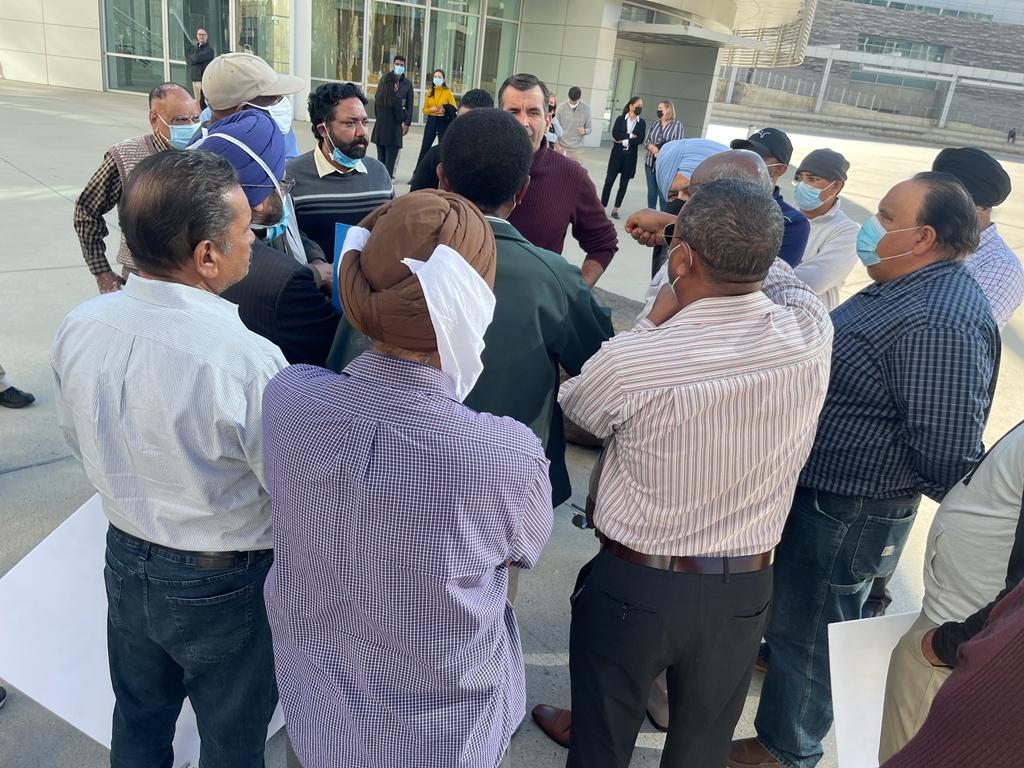The Mineta San Jose International Airport taxicab dispatch contractor is asking independent drivers to pay increased fees. Some drivers aren’t having it.
Dozens of independent taxicab drivers are protesting rules from Safer, LLC, the airport’s taxi dispatch contractor. According to drivers, they began a strike on Nov. 16 and plan to stay off the job until a new agreement with the city is reached.
Safer has implemented a 25% per-ride fee on drivers, along with per-trip fees and a new dress code. The move could threaten airport services as the winter holiday season approaches.
“We end up getting almost nothing,” Kirpal Bajwa, a driver who organized the strike, told San José Spotlight.
Bajwa and other striking drivers led a protest Monday. More than a dozen taxis drove from the airport to San Jose City Hall where they met with Mayor Sam Liccardo. A spokesperson for Liccardo’s office told San José Spotlight the mayor is working with all parties involved to develop a resolution.
The 25% fee, along with other associated airport fees, comes out of a driver’s per-ride share when riders book through Safer’s app, online or at the Safer airport kiosk. Travelers are able to prebook and prepay their trips, similar to requests on rideshare apps such as Lyft and Uber.
Before Safer’s contract, drivers paid $330 per month in order to use the airport. In addition, they paid a $1.55 fee per ride to manage airport permits plus the airport’s per-trip fee. Safer did away with the $330 per month model. For passengers who book through Safer’s app, online or kiosk, taxicab drivers will pay $1.50 per ride plus 25% of the total cost of that ride. On top of that, drivers still have to pay the airport’s per-trip fee.
“What are the gas prices now? What about maintenance? What about my children? What is left? That is what we’re fighting,” Bajwa said.

The new contract with Safer includes a strict dress code for drivers: a black necktie with the company’s logo on it, a white dress shirt, black slacks, black dress shoes, black gloves and a black Safer-branded jacket. The dress code has upset drivers who don’t want to be associated as employees of the company since they are independent contractors.
Taxicab drivers, who are independent contractors, have been trying to fight off changes to their shrinking industry in the past few years. Taxi services dwindled at the beginning of the pandemic, as residents were encouraged to stay home to prevent the spread of COVID-19. In October, a city commission voted to delay an up to 250% increase in liability insurance.
The taxi industry has been decimated by both the rise of rideshare companies like Uber and Lyft and the pandemic. According to a March city memo, taxi trips dropped from an average 1,100 trips per day before the advent of Uber and Lyft to less than 360 trips per day before the pandemic. That number shrunk to 26 per day in January.
“Trips haven’t bounced back tremendously, and that’s understandable,” Larry Silva, president and general manager of Yellow Checker Cab Company Inc., told San José Spotlight. “Still, at the end of the day, drivers aren’t happy.”
The fees on top of a hurting industry come at a cost for Bajwa and his fellow drivers. One much steeper than they’re used to.
“We’ve been providing services to the city,” Bajwa said. “We’re not new. We’re experienced drivers, dedicated, law-abiding drivers. We contribute to the economy of the city. So what is our fate?”

‘Tis the season to travel
Brazil-based Safer entered a two-year contract with the city in March to provide services to the airport, along with three one-year options to extend its contract. According to a city memo and Safer’s website, San Jose is the first airport outside Brazil that it has partnered with.
According to airport officials, the airport and drivers are working with each other to address drivers’ concerns, including how to collect tips after the ride, which currently is not part of the kiosk system. Airport officials say the system favors both drivers, who get an opportunity to pick up additional passengers at terminals, and riders, who get the convenience of in-app services much like Uber and Lyft.
“The airport continues to encourage productive talks between the two groups, particularly regarding drivers’ concerns about the new technologies allowing prepayment of taxi fares at kiosks within the terminal,” airport spokesperson Keonnis Taylor told San José Spotlight. “With the holiday travel season now underway, Safer staff are assisting riders with placements as needed. The airport is continuing to monitor the situation closely.”
Contact Lloyd Alaban at [email protected] or follow @lloydalaban on Twitter.



Leave a Reply
You must be logged in to post a comment.